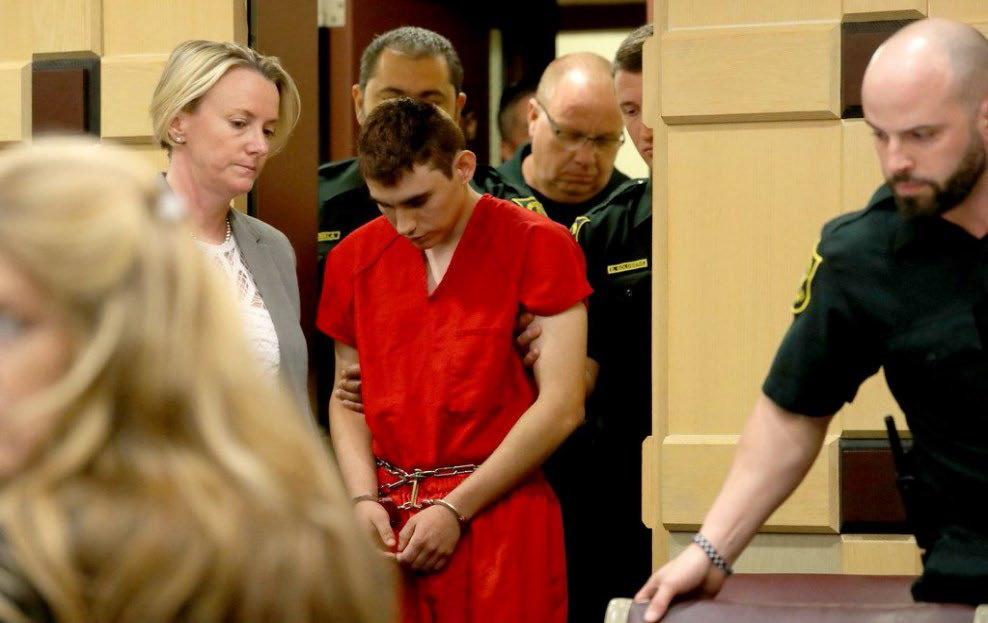
Main|Bio|Books|USA Today columns|Opeds|Boston.com blog|Media|Other Publications| Speaking|Links

Can we really spot and stop mass killers before they strike?
Caring for the mentally ill is important, but it's not law enforcement.
By James Alan Fox, Updated June 17, 2022

Nikolas Cruz appeared in court for a status hearing
before Broward Circuit
Judge Elizabeth Scherer on Feb. 19, 2018, in Ft. Lauderdale, Fla.
Cruz pleaded guilty in the deaths of 17 at Marjory Stoneman Douglas High School
in Parkland, Fla.,
and after several delays is expected to be sentenced this summer.
(Photo by Mike Stocker-Pool/Getty Images)(Pool / Getty Images)
In the
wake of mass public shootings in Buffalo, Uvalde, and Tulsa, lawmakers resistant
to gun restrictions, including Gov. Greg Abbott, have attempted to deflect the
blame to mental illness, and a majority of the public apparently agrees.
According to a CBS News poll taken earlier this month, three out of five
Americans — Democrats and Republicans alike — believe that improved mental
health screening and treatment can prevent rampage shootings.
Although mental illness may seem like a compelling explanation for senseless
slaughter, the facts say otherwise. Notwithstanding a few high-profile
assailants whose mental health issues are well-documented, including the gunman
who killed seven and injured dozens more in the August 2019 Midland-Odessa
shooting spree, no clear relationship between psychiatric diagnosis and mass
murder has been established.
Only about one-in-ten mass murderers showed signs of severe mental Illness,
according to researchers at the Columbia University Department of Psychiatry. Of
course, mental illness is more apt to be implicated among those assailants who
indiscriminately target relative strangers in a public setting. But even then,
according to Florida State University criminologist Emma Fridel, as many as
two-thirds have no history of being treated for psychological conditions of any
kind. Discontented, yes; delusional, no. They may be mad, but in the sense of
being angry as opposed to being crazy.
Although there are relatively few mass killers with severe psychiatric
disorders, many others have struggled mightily with social isolation,
depression, or anger issues. They may be dejected (for example, over repeated
job loss or financial ruin), rejected (such as "incels" who blame womankind for
their lack of romantic fulfillment), or hate-filled (as in those motivated by
racism, antisemitism, or xenophobia). Some just seek out a soft target, such as
a school or restaurant, to punish society for their own failures and
frustration.
Since the Uvalde shooting, troubling details have surfaced about the 18-year-old
gunman. Reportedly, he had tortured cats, talked tough in online chat rooms, and
purposely cut himself. Knowing the crime that he ultimately perpetrated, these
revelations are not especially surprising, but they also are not particularly
predictive of mass murder. It is a problem of finding needles in haystacks.
Unfortunately, countless teenagers exhibit such behaviors and even brag about
violent plans, yet most never seriously harm any human being, other than perhaps
themselves.
While it is regrettable that steps were not taken to intervene before the Uvalde
shooter gunned down 21 innocents, there is hardly a guarantee that bloodshed
would have been averted if they were. There is a long list of mass killers —
from UT Tower sniper Charles Whitman to Sutherland Springs gunman Devin Kelley —
who committed atrocities despite having received mental health services.
It would be a fitting legacy to the tragedy of mass murder if the mental health
system were improved. However, greater access to treatment options would not
necessarily reach the few individuals on the fringe who might seek to turn a
supermarket, school, church, or medical facility into their own personal war
zone.
With their tendency to externalize blame and consider themselves victims of
injustice, mass killers typically reject the idea that anything is wrong with
them. Plus, an overly aggressive approach to try and coerce disgruntled,
disaffected, and disappointed individuals into therapy, or to confiscate their
firearms, can actually intensify their sense of persecution and inadvertently
precipitate the very violent act we wish to prevent.
In a speech delivered in Hartford, Conn., months after the Sandy Hook school
massacre, President Obama urged Congress to respond: "We have to ... help people
struggling with mental health problems get the treatment they need before it is
too late." He’s right. We should help the mentally ill. But we should do so out
of concern for their own well-being, not just out of concern for the well-being
of those they might shoot.
We must resist the urge to equate mental illness with mass murder. Proposals to
correct the flaws in the mental health system exposed by certain mass killings
tend to stigmatize the vast majority of people who suffer from psychiatric
ailments but in no way pose a threat of violence to others.
Mental health treatment options should be expanded in light of the millions of
Americans who could benefit, not just for the few disturbed individuals who
might take a stand with a weapon in hand. Improving access to mental health
services is absolutely the right thing to do, but mass murder is not the only
reason to do it.
A far more effective way to prevent mass murder would be to keep deadly weapons
away from troubled or broken individuals; however, this is far more easily
articulated than accomplished. It would take a level of background screening for
gun purchasing that is far more thorough than what is currently in place. Sadly,
this does not seem to be in the cards.
James Alan Fox, is a professor of criminology, law
and public policy at Northeastern University, and co-author of Extreme Killing:
Understanding Serial and Mass Murder. He wrote this for The Dallas Morning News.
Website:
https://jamesalanfox.com
Follow him on
Twitter @jamesalanfox
Actual Article Link (Needs Dallas Morning News Acct. to
View):
https://www.dallasnews.com/opinion/commentary/2022/06/19/can-we-really-spot-and-stop-mass-killers-before-they-strike/